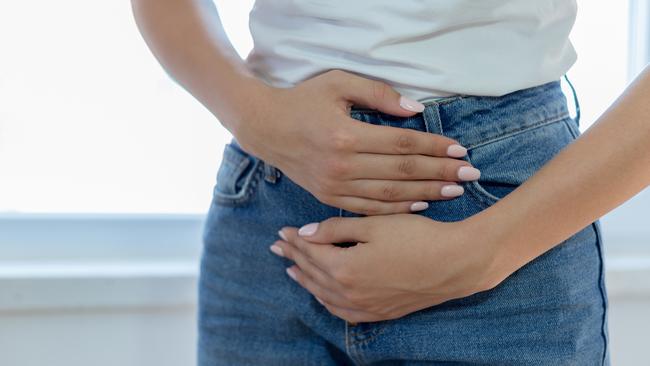All Australians should get paid reproductive health leave, advocates say
Leave for reproductive health conditions would benefit both women and men, experts say, urging employers to emerge from the “dark ages” on the issue.

Careers
Don't miss out on the headlines from Careers. Followed categories will be added to My News.
Paid menstrual and menopause leave is emerging as a double-edge sword for women, who desperately want more workplace support but fear it may lead to discrimination.
As momentum for women’s health leave grows, research reveals more than three-quarters of women believe employers will use menstrual and menopause leave as a reason to discriminate against them.
The Jean Hailes for Women’s Health research finds almost two-thirds of women support additional leave for menstrual and menopausal issues, mirroring other similar recent survey results.
But it also shows reservations in accessing such leave, with many women uncomfortable asking for menstrual leave and almost two-thirds embarrassed to tell their employer they had their period.
More than four in five women believe employers and work colleagues would not be understanding of leave requests for women’s health concerns, the research reveals.
“Those (fears around discrimination) are very valid,” says Gemma Lloyd, founder of jobs network Work180, whose own research has found menopause policies are now a top priority for women workers.
“Many workplaces are stuck in the dark ages and it’s not safe for women to have conversations around women’s health issues.
“I have worked in those types of (unsupportive) environments before – you get treated differently and it doesn’t end well.
“If you’re a woman working in an organisation that’s not supportive, I would encourage you to leave.”


Policy talks underway
A proposal to introduce 10 days of paid reproductive leave is set to be endorsed by the Australian Council of Trade Unions in June, paving the way for the Labor Party to campaign for a national reproductive leave scheme in the lead-up to next year’s federal election.
Already, the Queensland government is talking with unions to introduce reproductive leave for its public servants, while Queensland Council of Unions general secretary Jacqueline King expects reproductive leave to be available across Australia within the next five years.
More than 90 per cent of women currently go to work with debilitating period pain, with more than three-quarters prevented from properly doing their job, King says.
Under the union proposal, paid leave will be available for IVF treatment, chronic conditions such as endometriosis or menstrual issues, prostrate or breast cancer screening, vasectomy recovery or other reproductive health issues.
“We want to see every worker able to access 10 days’ (reproductive) leave, in much the same way workers can access family and domestic violence leave,” King says.
Five days a year of leave for issues that arise from menstruation, menopause, IVF and other reproductive health conditions has also been offered to Victoria’s public servants for the first time under a new four-year pay deal, it was revealed this week.
‘Wear short sleeves’
HR specialist Kerry McNamee went through surgically-induced menopause three years ago, enduring intense migraines, night sweats, heart palpitations and “myriad other symptoms” that impacted her ability to work.
Told by her boss and work mates to “go to bed earlier” to account for her disrupted sleep and “wear short sleeves” to help her hot flushes, the lack of support eventually led McNamee to quit her job.
“I wanted to stay in the workplace – I’m passionate about my work,” says McNamee, who now works as an employee engagement specialist with home builder ABN Group and is an advocate for Menopause Friendly Australia.
“Surgically induced menopause is very, very intense. It’s very different to normal menopause, which is a slow onslaught of symptoms.
“Having something like menopause leave would have been a benefit. It would give people the opportunity to look after themselves and come back to work and be the best version of themselves, which means (employers) get the best out of them.”

Male menopause
Women leave employment seven years earlier than men – often due to reproductive health issues, says Maurice Blackburn lawyer Jessica Heron, who has had input into the union proposal.
This impacts workplace diversity, business productivity and women’s finances.
She hopes the introduction of paid reproductive leave will help address these issues, but says recognising that men require time off work for reproductive concerns is also important.
“We’re not making this (proposed leave policy) gender-specific,” Heron says. “Andropause (the age-related reduction of testosterone) is very real.
“Initially, we focused on menstruation and menopause but there’s a lot of things that go on with reproductive health and … I want to see men being part of the conversation more. At the moment, they really haven’t been.”
A right for all
Jean Hailes for Women’s Health chief executive officer Dr Sarah White agrees, cautioning that while the research backs menstruation and menopause leave, this does not mean women only support leave for these concerns.
“Women say they support menstrual and menopause leave because we asked specifically about those issues. However, women also support additional paid leave for anyone managing a health issue,” she says.
“Every women’s health issue is valid and it would be unfair if workplace flexibility was to prioritise menstruation or menopause over, for example, endometriosis or fibromyalgia.
“Men (should be provided with leave) too, if they are suffering (from reproductive health issues).
“The goal is simple – foster an environment where supporting health is a priority and where flexibility is not just a perk but a right for all.”
Key elements of proposed reproductive health leave:
• Covers additional leave for chronic medical issues related to menstruation and menopause and managing issues such as time off for IVF treatment
• Also includes preventative health leave for vasectomies, hysterectomies, end of pregnancies and breast, cervical and prostrate screening.
• Provides 10 days’ paid non-cumulative reproductive health leave per year
• Applies to all employees other than casual employees, with part-time workers to access leave on a pro-rata basis.
Source: Queensland Council of Unions
Originally published as All Australians should get paid reproductive health leave, advocates say


